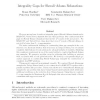106 search results - page 20 / 22 » Proving Lower Bounds Via Pseudo-random Generators |
FOCS
2010
IEEE
13 years 5 months ago
2010
IEEE
The Coin Problem is the following problem: a coin is given, which lands on head with probability either 1/2 + or 1/2 - . We are given the outcome of n independent tosses of this co...
BMCBI
2010
13 years 7 months ago
2010
Background: Ab initio protein structure prediction methods generate numerous structural candidates, which are referred to as decoys. The decoy with the most number of neighbors of...
STOC
2009
ACM
14 years 8 months ago
2009
ACM
We prove strong lower bounds on integrality gaps of Sherali?Adams relaxations for MAX CUT, Vertex Cover, Sparsest Cut and other problems. Our constructions show gaps for Sherali?A...
CORR
2006
Springer
13 years 7 months ago
2006
Springer
: A local search algorithm operating on an instance of a Boolean constraint satisfaction problem (in particular, k-SAT) can be viewed as a stochastic process traversing successive ...
SIAMCOMP
2002
13 years 7 months ago
2002
Abstract. In the multiarmed bandit problem, a gambler must decide which arm of K nonidentical slot machines to play in a sequence of trials so as to maximize his reward. This class...

